
Browse an alphabetical list of photographs. These historical images portray people, places, and events before, during, and after World War II and the Holocaust.
<< Previous | Displaying results 201-225 of 226 for "Photo" | Next >>
Survivors of the Ampfing subcamp of the Dachau concentration camp soon after liberation by US troops. Ampfing, Germany, May 4, 1945.
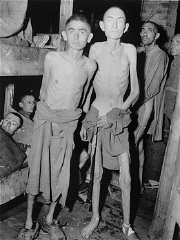
Soon after liberation, camp survivors wait for rations of potato soup. Bergen-Belsen, Germany, April 28, 1945.
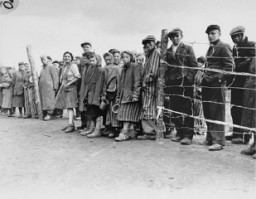
Emaciated survivors of the Buchenwald concentration camp soon after the liberation of the camp. Germany, after April 11, 1945.
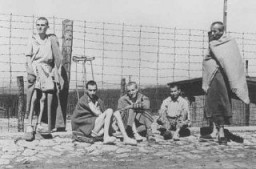
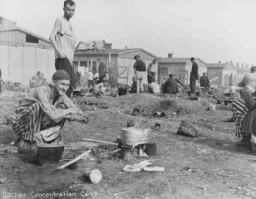
Emaciated survivors in the Ebensee subcamp of the Mauthausen concentration camp suck on sugar cubes provided by US soldiers upon the liberation of the camp. Photograph taken by Signal Corps photographer J Malan Heslop. Ebensee, Austria, May 8, 1945.
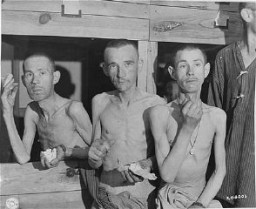
Survivors of the Ebensee subcamp of the Mauthausen concentration camp. Ebensee, Austria, May 8, 1945.
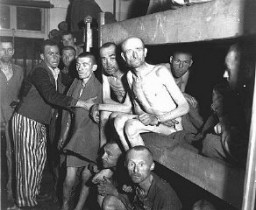
Survivors of the Buchenwald concentration camp gather around trucks carrying American troops. Germany, May 1945.
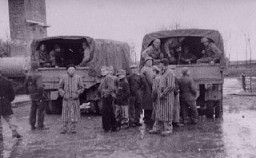
Two survivors of the Dora-Mittelbau concentration camp, located near Nordhausen. Germany, April 14, 1945.
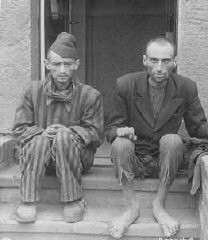
Emaciated survivors of the Mauthausen concentration camp soon after the liberation of the camp. Austria, May 1945.
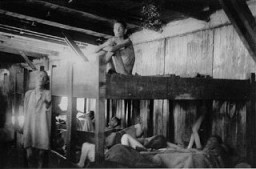
Five Jewish survivors pose for a US Signal Corps photographer in front of Block 2 in the Hanover-Ahlem camp, a subcamp of Neuengamme. Hanover-Ahlem, Germany, April 11, 1945.
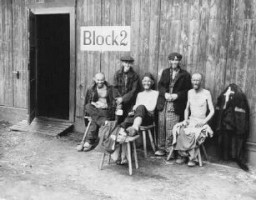
Soon after liberation, camp survivors cook in a field. Bergen-Belsen, Germany, after April 15, 1945. In the days before liberation, the prisoners had been left without food or water. More than 13,000 inmates died in the three months following liberation.
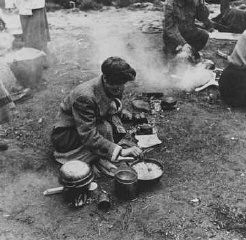
Survivors waiting for to be evacuated from the Wöbbelin concentration camp to receive medical attention at a field hospital. Germany, May 4, 1945.
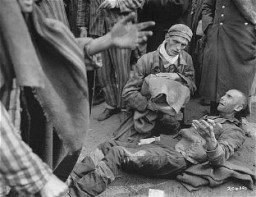
Photograph taken in December 1932 of Suse Grunbaum at age one. Soon after Hitler's 1933 seizure of power in Germany, two-year-old Suse and her parents fled to the Netherlands and settled in the town of Dinxperlo. In 1943, Jews in German-occupied Dinxperlo were ordered to assemble for deportation. Hearing of these plans, the Grünbaums went into hiding, finding refuge with Dutch farmers. The Hartemink family hid Suse and her mother for two years in their barn, first under the floorboards, then in a…
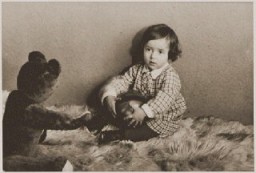
German (swastika) and Olympic flags fly in Berlin during the Olympic Games. Berlin, Germany, August 1936.
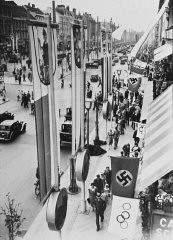
A flag bearing a swastika is raised over the city hall in Sarajevo after German forces captured the city. Sarajevo, Yugoslavia, April 16, 1941.

Members of a German military unit swear allegiance to Adolf Hitler. Germany, date uncertain.
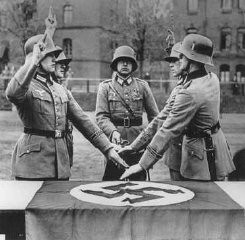
Swedish "protective pass" issued to Lili Katz, a Hungarian Jew. The document was initialed by Raoul Wallenberg (bottom left). Budapest, Hungary, August 25, 1944.
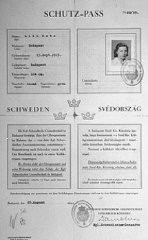
Swedish protective pass issued to Joseph Katona, the Chief Rabbi of Budapest. Budapest, Hungary, September 15, 1944.
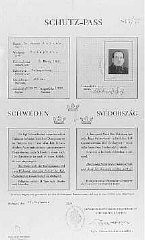
Members of the United States Holocaust Memorial Council pose with two milkcans containing a Scroll of Remembrance signed by Holocaust survivors at a symbolic groundbreaking ceremony for the United States Holocaust Memorial Museum. Benjamin Meed is second from the left. Washington, DC, April 30, 1984. During groundbreaking ceremonies in April 1985, the containers were buried on the site of the Museum.
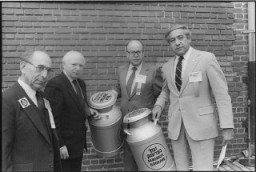
Sephardic synagogue destroyed during the January 21-23 Iron Guard pogrom. Bucharest, Romania, January 1941.
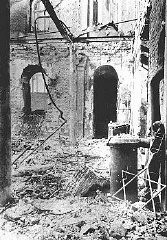
Interior of a synagogue destroyed during Kristallnacht (the "Night of Broken Glass"). Dortmund, Germany, November 1938.
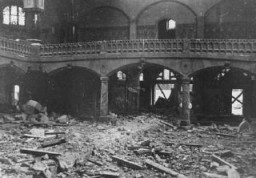
As the synagogue in Oberramstadt burns during Kristallnacht (the "Night of Broken Glass"), firefighters instead save a nearby house. Local residents watch as the synagogue is destroyed. Oberramstadt, Germany, November 9-10, 1938.
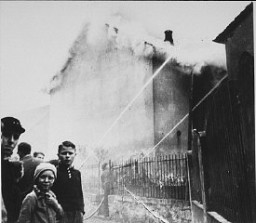
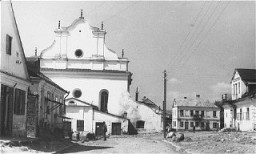
The New Synagogue in Trieste, Italy. It opened in 1912 and was desecrated by the Nazis on July 18, 1942. Trieste, Italy, July 18, 1942.
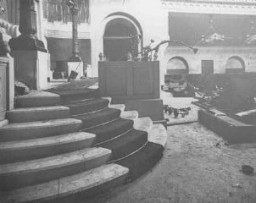
A synagogue used as a warehouse for the belongings of deported Jews. Szeged ghetto, Hungary, 1944.
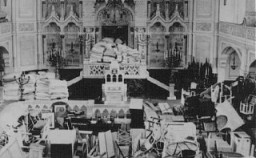
We would like to thank Crown Family Philanthropies, Abe and Ida Cooper Foundation, the Claims Conference, EVZ, and BMF for supporting the ongoing work to create content and resources for the Holocaust Encyclopedia. View the list of donor acknowledgement.